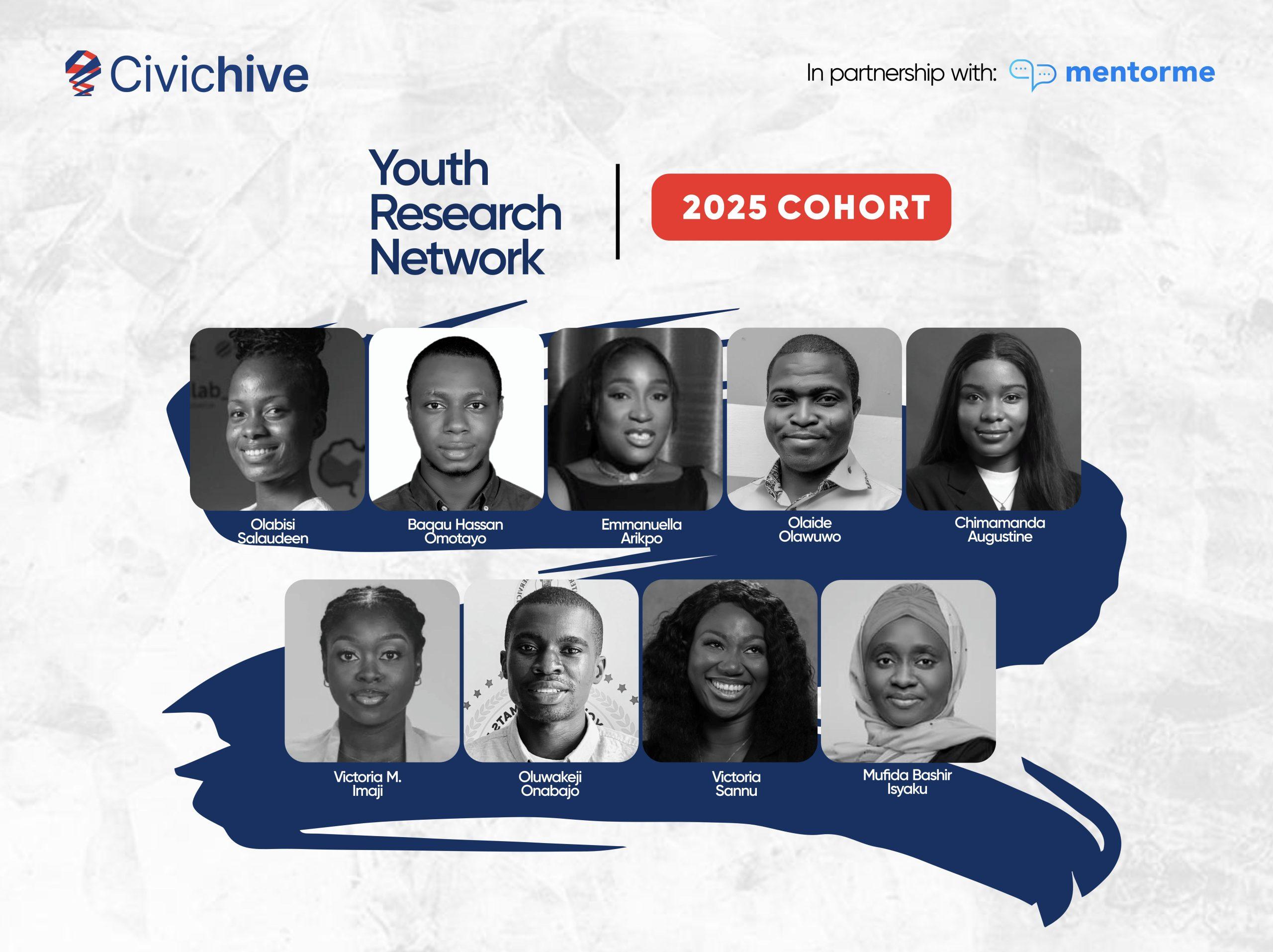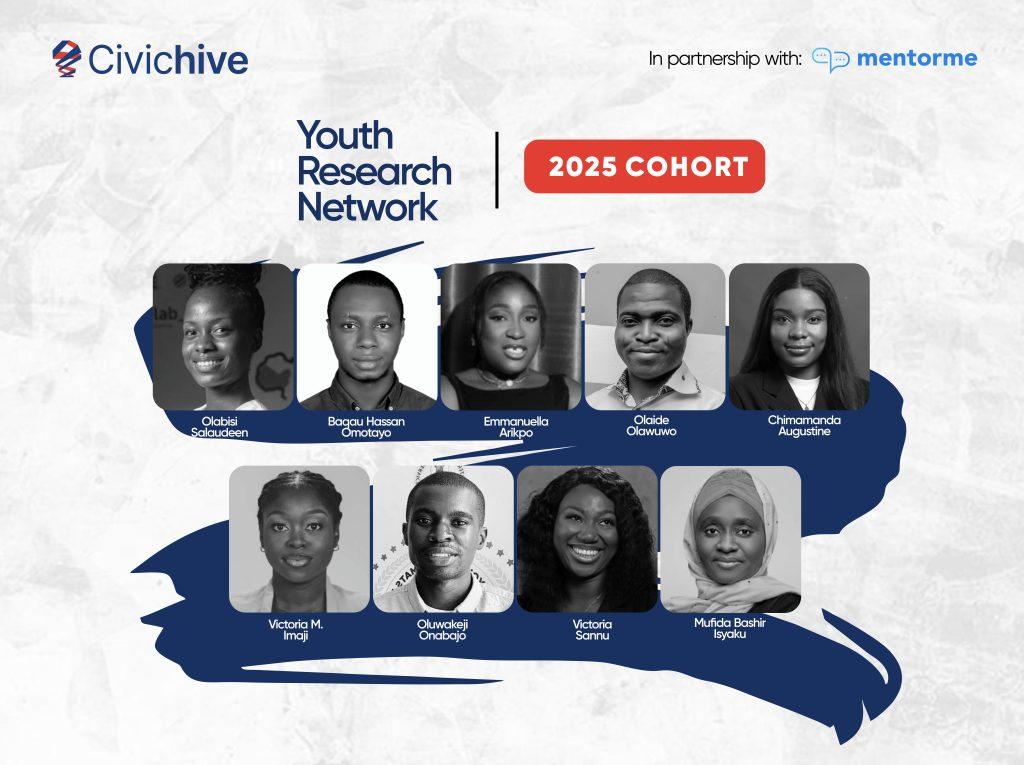
Nigeria is a youth-rich nation, with nearly 60% of its population under the age of 25. This powerful demographic holds immense potential to reshape the country’s future yet remains largely disengaged from civic life. A major reason is the lack of access to civic education and limited understanding of governance structures, which results in apathy, low representation in decision-making spaces, and a general disconnect from societal challenges.
Recognizing this gap, CivicHive, in partnership with MentorMe Nigeria, launched the Youth Research Network, a program committed to empowering young Nigerians to become active participants in governance by using research, creativity, and collaboration as tools for change. At its core, the network is inspired by findings such as those from the Institute for Government’s 2019 report, which emphasized the need to better integrate academic knowledge into policy-making.
The report highlighted that research often fails to influence governance because academics lack access to policymakers, are not trained for public engagement, and receive little recognition for policy-related work.
Applying these insights locally, CivicHive has created a structure for young Nigerian researchers that support civic education, mentorship, and creative expression.
Why Is This Important?
Creativity plays a vital role in closing the gap between governance and everyday citizens. By transforming complex governance concepts into engaging, relatable content through writing, young people can better understand and influence the systems that shape their lives. The Youth Research Network harnesses this power by offering writing opportunities, mentorship from senior civic leaders, training workshops, and a vibrant community of changemakers. The goal is to build a generation of youth equipped not just with knowledge, but with the confidence and platforms to lead change.
Meet Our Researchers
- Mufida Bashir Isyaku: Bridging the Digital Gender Divide: Empowering Underserved Girls Through Digital Literacy and Employability Skills in Northern Nigeria
Mufida’s study focuses on how equipping underserved girls with digital literacy and job-readiness skills can boost their confidence, support their economic empowerment, and encourage active civic involvement, all within the broader goal of inclusive development. It is based on the belief that access to digital tools should be a basic right especially for young women who are often excluded from economic and civic spaces.
By examining both the opportunities and barriers within digital inclusion efforts, the research aims to generate actionable insights for youth-focused policies, gender-inclusive education, and programs led by civil society.
- Baqau Hassan Omotayo: Discourse or Display? Interrogating Representation and Power in the Nigerian Senate
Baqua’s study critically examines how language is used in the Nigerian Senate, revealing that parliamentary debates often serve elite interests rather than the public good. Using critical discourse analysis, it explores power dynamics, exclusion, and performative politics, highlighted by incidents like the clash between Senator Natasha Akpoti-Uduaghan and the Senate President. The research argues that the Senate’s discourse tends to marginalize key national issues and democratic ideals, calling for a more inclusive, accountable, and citizen-focused legislative process.
- Olabisi Salaudeen: Social Media as a CivicTech Tool
This study explores the role of social media as a civic technology, examining how platforms like Twitter, Facebook, and Instagram enable public participation, promote government transparency, and amplify marginalized voices. Using case studies, it highlights social media’s potential as a space for digital activism while also acknowledging its risks, such as misinformation and surveillance. The research concludes with recommendations for using social media more effectively and responsibly to support democratic engagement and digital governance.
- Olaide Olawuwo: Bridging the Gap: Leveraging Digital Platforms to Enhance Youth Participation in Local Governance and Policy Processes in Nigeria
This study explores how digital tools can improve youth participation in local governance in Nigeria, where over 70% of the population is under 30 yet remains largely excluded from policymaking. Through surveys, interviews, and case studies of civic tech platforms, it examines barriers to engagement and highlights strategies for scaling youth-led innovations. The goal is to promote inclusive, tech-driven governance that moves beyond tokenism and supports meaningful youth involvement in line with SDG 16.
- Victoria Saanu: Tracking Value For Money: The Consequence Of Public Audit Report In Nigeria’s Public Sector
This research examines the impact of public audit reports on accountability in Nigeria’s public sector, focusing on whether audit findings lead to corrective actions such as sanctions, policy reforms, or improved service delivery. Despite constitutional mandates, many audit recommendations go unimplemented, weakening democratic governance and public trust. Using a qualitative case study approach, the study will analyze audit reports, legislative responses, and media coverage across selected states (2020–2022), alongside interviews with key stakeholders. The goal is to identify enforcement gaps and highlight effective practices, offering insights to strengthen transparency, civic advocacy, and public financial accountability.
- Oluwakeji Onabajo: Media Representation and Community Perception in Ikorodu Division: Analyzing the Impact of Media Narratives on Local Development and Security
This study examines how media narratives shape public perception, policy responses, and community morale in Ikorodu Division, a rapidly growing suburb in Lagos State. Despite its development potential, Ikorodu is often portrayed negatively in the media, focusing on insecurity, cultism, and poor infrastructure, which can hinder progress and deepen stigma. Using content analysis, surveys, and interviews, the research analyzes how media framing influences both internal and external views of Ikorodu and explores the role of local journalism in providing more balanced, empowering narratives. The goal is to highlight media bias, promote inclusive storytelling, and encourage community-driven development through participatory communication.
- Arikpo Emmanuella: Policy Failure and the Politics of Rent: Investigating the Exploitation of Young Tenants in Nigeria’s Urban Housing Market
This study investigates how policy failures and weak regulation in Lagos’s housing market enable exploitative rental practices that disproportionately affect young tenants. It focuses on the roles of rental agents, landlords, and ineffective regulatory bodies in driving rent inflation and imposing unregulated fees. Using surveys and interviews with tenants aged 18–35, the research explores the economic and emotional impact of housing stress. It also reviews relevant tenancy laws to assess enforcement gaps. The goal is to provide actionable, youth-centered policy recommendations to improve tenant protection, enhance transparency, and support grassroots housing advocacy in urban Nigeria.
- Victoria Imaji: Exploring Enugu State’s Climate Policy: A Youth-Driven Path to Sustainable Growth.
This study explores how Enugu State can effectively implement its climate policy and action plan by harnessing youth leadership to drive sustainable development. With challenges such as deforestation, environmental degradation, and rising emissions, the research investigates strategies that address climate change while promoting economic growth. Using mixed methods, including literature reviews, community interviews, and case studies, the study aims to provide practical, youth-centered policy recommendations. It highlights the crucial role of young people in climate action and offers guidance for both policymakers and grassroots organizations to build a resilient, sustainable future for Enugu State and beyond.
Conclusion
Across these diverse but interconnected studies, one clear theme emerges: young people are not just beneficiaries of governance and policy they also serve as vital actors in shaping it. From climate action in Enugu to housing justice in Lagos, digital civic engagement, audit accountability, media representation in Ikorodu, and Senate discourse in Abuja, each research project reveals how policy gaps, power dynamics, and institutional weaknesses often marginalize youth voices. Yet, they also highlight the transformative potential of inclusive, youth-driven approaches that blend research, advocacy, and innovation.
As we continue to bridge academia with governance, these projects serve as timely interventions that not only expose systemic challenges but also offer actionable, context-specific solutions. Together, they contribute to building a more just, participatory, and youth-responsive society.
Reference
Sasse, T., & Haddon, C. (2019). How academia can work with the government. Institute for Government. https://www.instituteforgovernment.org.uk/sites/default/files/publications/IfG_Academic_and_gov_2019_WEB_FINAL.pdf

